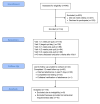Reliability and validity of measures of impulsive choice and impulsive action in smokers trying to quit
- PMID: 26751623
- PMCID: PMC4887270
- DOI: 10.1037/pha0000061
Reliability and validity of measures of impulsive choice and impulsive action in smokers trying to quit
Abstract
Cross-sectional research suggests that smokers are more impulsive than are nonsmokers, but few studies have examined relations between impulsiveness and later success in quitting smoking. The purpose of this study was to investigate the reliability and predictive validity of facets of impulsiveness in adult smokers trying to quit. Baseline behavioral measures of impulsive choice (assessed with a delay discounting task) and impulsive action (assessed with a measure of behavioral disinhibition) were used as predictors of smoking cessation success over 12 weeks. The sample included 116 adult (18 years old or older) daily smokers from central New Jersey. Impulsive choice, impulsive action, and self-reported impulsiveness were not significantly related to one another at baseline. Impulsive choice had high test-retest reliability from pre- to postquit, whereas impulsive action was less stable. Test-retest reliability from prequit to 3 weeks' postquit was moderated by achievement of 7-day abstinence. Baseline impulsive action was significantly negatively related to quitting for at least 1 day in the first 2 weeks of a quit attempt and of prolonged abstinence (no relapse over the next 10 weeks). Baseline impulsive choice was robustly associated with biochemically verified 7-day point-prevalence abstinence 12 weeks' postquit, such that those with lower delay discounting were more likely to achieve abstinence. Facets of impulsiveness appear to function largely independently in adult smokers, as indicated by their lack of intercorrelation, differential stability, and differential relations with abstinence. Impulsive action may impede initial quitting, whereas impulsive choice may be an obstacle to maintaining lasting abstinence.
(c) 2016 APA, all rights reserved).
Similar articles
-
Momentary assessment of impulsive choice and impulsive action: Reliability, stability, and correlates.Addict Behav. 2018 Aug;83:130-135. doi: 10.1016/j.addbeh.2017.11.031. Epub 2017 Nov 22. Addict Behav. 2018. PMID: 29221928 Free PMC article.
-
Contingency management improves smoking cessation treatment outcomes among highly impulsive adolescent smokers relative to cognitive behavioral therapy.Addict Behav. 2015 Mar;42:86-90. doi: 10.1016/j.addbeh.2014.11.009. Epub 2014 Nov 20. Addict Behav. 2015. PMID: 25462659 Free PMC article.
-
Effects of smoking abstinence on impulsive behavior among smokers high and low in ADHD-like symptoms.Psychopharmacology (Berl). 2012 Jan;219(2):537-47. doi: 10.1007/s00213-011-2324-2. Epub 2011 May 11. Psychopharmacology (Berl). 2012. PMID: 21559802 Free PMC article.
-
Dimensions of impulsive behavior: Predicting contingency management treatment outcomes for adolescent smokers.Addict Behav. 2019 Mar;90:334-340. doi: 10.1016/j.addbeh.2018.11.031. Epub 2018 Nov 23. Addict Behav. 2019. PMID: 30508743 Free PMC article.
-
Does impulsiveness moderate response to financial incentives for smoking cessation among pregnant and newly postpartum women?Exp Clin Psychopharmacol. 2015 Apr;23(2):97-108. doi: 10.1037/a0038810. Epub 2015 Mar 2. Exp Clin Psychopharmacol. 2015. PMID: 25730417 Free PMC article. Clinical Trial.
Cited by
-
No differences in delay discounting between smokers with and without HIV.Psychopharmacology (Berl). 2021 Feb;238(2):529-537. doi: 10.1007/s00213-020-05701-x. Epub 2020 Nov 12. Psychopharmacology (Berl). 2021. PMID: 33180174 Free PMC article.
-
Trans-diagnostic measurement of impulsivity and compulsivity: A review of self-report tools.Neurosci Biobehav Rev. 2021 Jan;120:455-469. doi: 10.1016/j.neubiorev.2020.10.007. Epub 2020 Oct 25. Neurosci Biobehav Rev. 2021. PMID: 33115636 Free PMC article. Review.
-
Prospective Analysis of Behavioral Economic Predictors of Stable Moderation Drinking Among Problem Drinkers Attempting Natural Recovery.Alcohol Clin Exp Res. 2016 Dec;40(12):2676-2684. doi: 10.1111/acer.13245. Epub 2016 Oct 24. Alcohol Clin Exp Res. 2016. PMID: 27775161 Free PMC article.
-
Ecological momentary analysis of the relations among stressful events, affective reactivity, and smoking among smokers with high versus low depressive symptoms during a quit attempt.Addiction. 2018 Feb;113(2):299-312. doi: 10.1111/add.13964. Epub 2017 Oct 12. Addiction. 2018. PMID: 28779527 Free PMC article.
-
Delay discounting of different outcomes: Review and theory.J Exp Anal Behav. 2020 May;113(3):657-679. doi: 10.1002/jeab.589. Epub 2020 Mar 8. J Exp Anal Behav. 2020. PMID: 32147840 Free PMC article.
References
-
- Ataya AF, Adams S, Mullings E, Cooper RM, Attwood AS, Munafò MR. Internal reliability of measures of substance-related cognitive bias. Drug and Alcohol Dependence. 2012;121:148–151. http://dx.doi.org/10.1016/j.drugalcdep.2011.08.023. - DOI - PubMed
-
- Baker F, Johnson MW, Bickel WK. Delay discounting in current and never-before cigarette smokers: Similarities and differences across commodity, sign, and magnitude. Journal of Abnormal Psychology. 2003;112:382–92. doi: 10.1037/0021-843X.1123.382. - PubMed
-
- Bernow N, Kruck B, Pfeifer P, Lieb K, Tuscher O, Fehr C. Impulsiveness and Venturesomeness in German Smokers. Nicotine & Tobacco Research. 2011;13(8):714–721. doi: 10.1093/ntr/ntr064. - PubMed
-
- Bickel WK, Odum AL, Madden GJ. Impulsivity and cigarette smoking: Delay discounting in current, never, and ex-smokers. Psychopharmacology. 1999;146:447–54. doi: 10.1007/PL00005490. - PubMed
Publication types
MeSH terms
Grants and funding
LinkOut - more resources
Full Text Sources
Other Literature Sources
Medical


